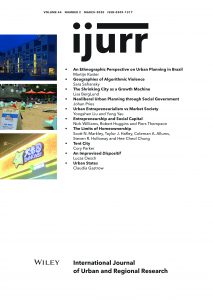This article provides an ethnographic perspective on urban planning by presenting the creative practices of marginalized slum residents in Recife, Northeast Brazil, who are affected by planners’ decisions. It argues that such a perspective contributes to current critical urban theory in three ways. First, while many studies of urban planning follow the temporality of the timeframe of a particular project (‘project time’), this analysis emphasizes the timeframe of the lives of the affected residents (‘people’s time’). Second, it attends to diversity, taking account of the variety of affected residents and the diverse consequences of urban planning on their lives. Third, it shows how urban interventions — similar to marriage, divorce, the birth of children and the death of loved ones — are high‐impact life events for the urban poor. Finally, the article assesses the engagement between ethnography and critical urban theory and argues in favour of ‘grounding’ the latter better in the analysis of actual practices and experiences.

